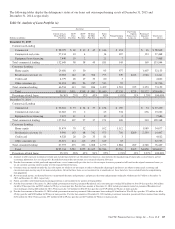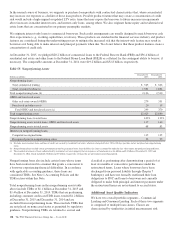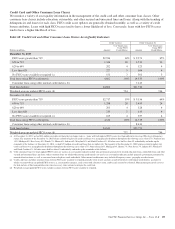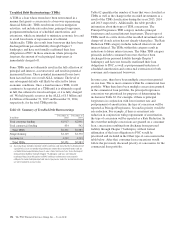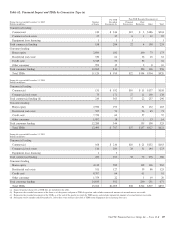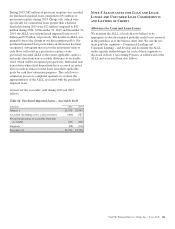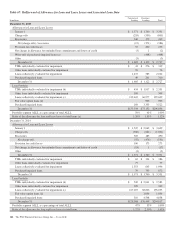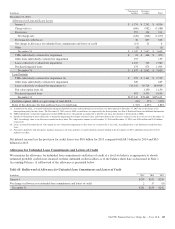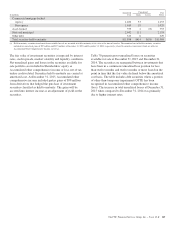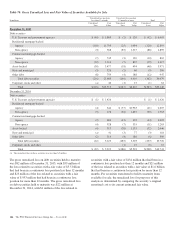PNC Bank 2015 Annual Report Download - page 154
Download and view the complete annual report
Please find page 154 of the 2015 PNC Bank annual report below. You can navigate through the pages in the report by either clicking on the pages listed below, or by using the keyword search tool below to find specific information within the annual report.
Troubled Debt Restructurings (TDRs)
A TDR is a loan whose terms have been restructured in a
manner that grants a concession to a borrower experiencing
financial difficulty. TDRs result from our loss mitigation
activities, and include rate reductions, principal forgiveness,
postponement/reduction of scheduled amortization, and
extensions, which are intended to minimize economic loss and
to avoid foreclosure or repossession of collateral.
Additionally, TDRs also result from borrowers that have been
discharged from personal liability through Chapter 7
bankruptcy and have not formally reaffirmed their loan
obligations to PNC. In those situations where principal is
forgiven, the amount of such principal forgiveness is
immediately charged off.
Some TDRs may not ultimately result in the full collection of
principal and interest, as restructured, and result in potential
incremental losses. These potential incremental losses have
been factored into our overall ALLL estimate. The level of
any subsequent defaults will likely be affected by future
economic conditions. Once a loan becomes a TDR, it will
continue to be reported as a TDR until it is ultimately repaid
in full, the collateral is foreclosed upon, or it is fully charged
off. We held specific reserves in the ALLL of $.3 billion and
$.4 billion at December 31, 2015 and December 31, 2014,
respectively, for the total TDR portfolio.
Table 61: Summary of Troubled Debt Restructurings
In millions
December 31
2015
December 31
2014
Total consumer lending $1,917 $2,041
Total commercial lending 434 542
Total TDRs $2,351 $2,583
Nonperforming $1,119 $1,370
Accruing (a) 1,232 1,213
Total TDRs $2,351 $2,583
(a) Accruing loans include consumer credit card loans and loans that have demonstrated
a period of at least six months of performance under the restructured terms and are
excluded from nonperforming loans. Loans where borrowers have been discharged
from personal liability through Chapter 7 bankruptcy and have not formally
reaffirmed their loan obligations to PNC and loans to borrowers not currently
obligated to make both principal and interest payments under the restructured terms
are not returned to accrual status.
Table 62 quantifies the number of loans that were classified as
TDRs as well as the change in the recorded investments as a
result of the TDR classification during the years 2015, 2014
and 2013 respectively. Additionally, the table provides
information about the types of TDR concessions. The
Principal Forgiveness TDR category includes principal
forgiveness and accrued interest forgiveness. These types of
TDRs result in a write down of the recorded investment and a
charge-off if such action has not already taken place. The Rate
Reduction TDR category includes reduced interest rate and
interest deferral. The TDRs within this category result in
reductions to future interest income. The Other TDR category
primarily includes consumer borrowers that have been
discharged from personal liability through Chapter 7
bankruptcy and have not formally reaffirmed their loan
obligations to PNC, as well as postponement/reduction of
scheduled amortization and contractual extensions for both
consumer and commercial borrowers.
In some cases, there have been multiple concessions granted
on one loan. This is most common within the commercial loan
portfolio. When there have been multiple concessions granted
in the commercial loan portfolio, the principal forgiveness
concession was prioritized for purposes of determining the
inclusion in Table 62. For example, if there is principal
forgiveness in conjunction with lower interest rate and
postponement of amortization, the type of concession will be
reported as Principal Forgiveness. Second in priority would be
rate reduction. For example, if there is an interest rate
reduction in conjunction with postponement of amortization,
the type of concession will be reported as a Rate Reduction. In
the event that multiple concessions are granted on a consumer
loan, concessions resulting from discharge from personal
liability through Chapter 7 bankruptcy without formal
affirmation of the loan obligations to PNC would be
prioritized and included in the Other type of concession in the
table below. After that, consumer loan concessions would
follow the previously discussed priority of concessions for the
commercial loan portfolio.
136 The PNC Financial Services Group, Inc. – Form 10-K



